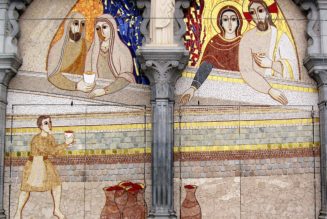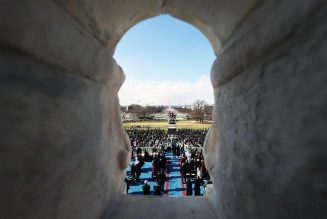By Dr. Jeff Mirus ( bio – articles – email ) | Mar 02, 2023
The recent efforts of Cardinal Robert McElroy to publicly advance the full inclusion in the Church of those who self-identify as practicing homosexuals has raised eyebrows. That is not saying much, of course, but it indicates that this is a slight escalation in the widespread effort to undermine the Church’s fidelity to the mission entrusted to her by Jesus Christ. A great many Catholics have been guilty of one sexual sin or another, of course, but we have not insisted on declaring our sins a lifestyle choice which the Church must recognize as virtuous. Moreover, it is the peculiar curse of our own era that so much of the widely reported clerical and theological commentary on human sexuality is designed to make it seem impossible for the Church to distinguish between virtue and vice.
It seems that as long as we sincerely embrace our “feelings” and allow for the free consent of those with whom we hope to share them, then we cannot sin. In other words, we can do no wrong as long as we observe the canons of current secular attitudes on sexuality (just as was done in the ancient pagan world, for example). Apparently we have “discovered” that if a person experiences a temptation that suggests a natural inclination to a certain form of behavior, the resulting acts must be considered virtuous. After all, as long as others freely consent to any particular evil, where is the harm?
Of course when it comes to anything “objective”, such as sins against wealth and property, this reasoning may not be held to apply. Well, it’s a funny old world.
A significant clash
But back to Cardinal McElroy. Though he does seem to be particularly favored by Pope Francis, controversy surrounding this prelate is not new. As a mere bishop back in 2017, he was already exclaiming that ‘Attacks on Father James Martin expose a cancer within the US Catholic Church’, which is odd since Fr. Martin has been in the forefront of pretending that homosexual behavior is not sinful. Bishop McElroy even saw a ‘historic moment’ in the Biden inauguration. Of course it is hard to argue with that, considering the nominally Catholic Biden has worked tirelessly to undermine the fundamental principles of Catholic faith and morals. Perhaps his election is a “historic moment” in a deeper sense.
These early signs are not unrelated to the issue at hand. The following headlines suggest that not every Catholic leader is prepared to embrace McElroy’s pop-cultural take on human sexuality, nor even to ignore it:
Consider yourself up to date. It is extraordinarily sad, of course, that Pope Francis seems so often to be pleased with very doubtful characters in the Church (such as, in this case, both Martin and McElroy), but the Pope himself somehow never says or teaches anything quite so extreme as those he favors. This is curious, but there is nothing we can do about it. What we can do is better understand what is at stake in this modern tendency to push the envelope on human sexuality, and why it is important for bishops to learn to be forthright and even medicinally frank in their Catholic leadership.
At this point the scandal of silence is worse than the scandal of public correction. There is no responsible future in hanging back until one feels a favorable wind from Rome. If Rome is burning, should we fiddle? After all, the first defense against faulty episcopal (and even cardinalatial) teaching ought to be fraternal correction by those facing the same issues in the same region. In fact, learning how to address regional challenges to the Gospel faithfully and effectively is the most important single fruit of an authentic synodality in the Church.
Willful blindness
There is a larger picture here, the picture of an atomized society which is buttressed by no strong intermediary institutions and has been carefully taught that individual rights are all that matter—except of course in the cases of those who oppose the dominant secular culture, who gradually fall victim to a veiled totalitarianism. In modern “secular liberal democracies”, the dominant culture effectively militates against the Catholic Church ever being a significant intermediary institution, let alone an institution with a privileged grasp of Divine Revelation and Natural Law (in case anyone cares). Consequently, even Churchmen frequently seek relevance by proving their acceptability on issues of current interest to that dominant culture.
There is nothing mysterious here: We humans always know which way the wind is blowing, and only recalcitrant minorities try to sail into the wind. After all, on good natural evidence, this is well-known to be impossible. But I emphasize the word natural, in which the missing factor is always grace—an effective engine that can be deployed only through trust in God:
Let those who fear the LORD say,
“His steadfast love endures for ever.”…
With the LORD on my side I do not fear.
What can man do to me?…
It is better to take refuge in the LORD
than to put confidence in man.
It is better to take refuge in the LORD
than to put confidence in princes. [Ps 118:4-9]
Our entire culture is now built on the principle that what people do not know about morality will not hurt them; this is clearly rampant even within the Church. It has been a byword in many instances of religious instruction, RCIA programs, and moral theology for decades. The only aspect under which this attitude can be considered to contain any truth at all is that real (rather than deliberate) ignorance reduces culpability. When it comes to matters that ought to be apparent through the natural law, however, total ignorance can almost never be postulated; more frequently the problem is denial, a denial in which even highly-placed clerics too often participate.
Moreover, when will we learn the obvious? Again and again we have seen that moral turpitude lies at the root of theological, priestly and episcopal denial of the canons of sexual morality. Again and again we have found that prominent Catholic academicians, priests and bishops continuously develop intellectual justifications for the sins of which they themselves are guilty. In any given case, of course, this may not be so, and in any case we may not know. But again and again as a matter of historical record, we have seen that it has been precisely those already secretly ensnared in a sin who have been most active and prominent in justifying it—the blind leading the blind.
Paradoxical non-heterogeneity of modern culture
Our larger cultural situation, of course, is extraordinarily difficult. It is precisely in the modern liberal democracies that we are expected to learn to discount the differences among people of various backgrounds, learning to check at the door of acceptance anything that puts us at odds with the regnant liberal democratic “consensus”. We abandon and very frequently deliberately undermine our traditional ethnic or even religious formation in order to become full participants in the dominant secular culture. For all the praise and theoretical protection of ethnic and cultural diversity, we quickly learn that, in the massive liberal democratic social orders of our day, such diversity is welcome only as a charming quaintness that does not touch the secular liberal agenda—in other words, when it does not stray into religion or morality.
Now add to this the tangible results of several generations at sea in modernity: The expunging of moral instruction, the privatizing of religion as mere sentiment, the destruction of marriage and stable family life, the brain-washing in modern public education. At the very least, the North American and European countries are warehouses of ideological destruction (by which I do not mean the destruction of ideology). Some of us may live to hear the swan song of such cultures, instead of merely the repeated swanish songs before the swan song, but cultural dominance can take centuries to dissipate, no matter how reckless the values embraced by the culturally dominant.
In my last commentary (The ERA’s manipulation of thought and culture) I explored the patent reluctance of both modern philosophy and modern culture to move beyond the childish insistence on personal subjectivity as its own end—the insistence that whatever I feel that I want sets the horizon of my being, and that to be defined by my momentary subjective desires is the essence of what it means to be a free human agent. This is enticing, of course, but it is also deliberately foisted upon us by the modern State, which instinctively recognizes religious commitment as its enemy in the battle for souls.
The State, capitalizing on false theories of the human person, has engineered the destruction of the family, the irrelevance of the Church, and the moral evisceration of all particularized cultural formation. I am not saying we have not been willing participants. Prosperity and acceptance in a culture that emphasizes our right to define our own futures has many attractions as compared with traditional expectations. And of course the deficiencies of any and every human culture are legion. But the modern experiment has been one of marginalizing the unpleasantness of the important. The result has been not liberty but enslavement to wayward human desire: The selfish championing of the “individual”, if he is from the right group, or possesses the right wealth, or is eager to sing the right tune for his supper.
This is how cultures are homogenized and especially how the high among us are bought and paid for, as if spiritual and moral insights are mere peculiarities to be jettisoned for the common good. Even bishops, cardinals and popes sometimes want to be in the right group, possess the right wealth, or sing for their supper in the world. But in a healthy culture, this sort of thing really should be handled synodally. We desperately need more public battles. When we see an appropriate local or regional response to falsehood, it is a sign of Catholic health and a harbinger of Catholic growth.
Sound Off! CatholicCulture.org supporters weigh in.
All comments are moderated. To lighten our editing burden, only current donors are allowed to Sound Off. If you are a current donor, log in to see the comment form; otherwise please support our work, and Sound Off!











